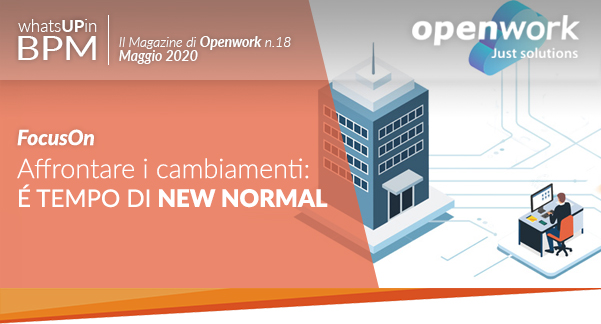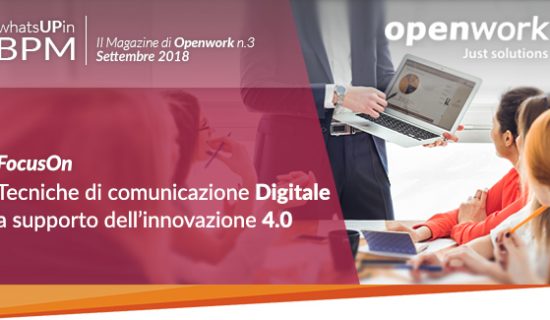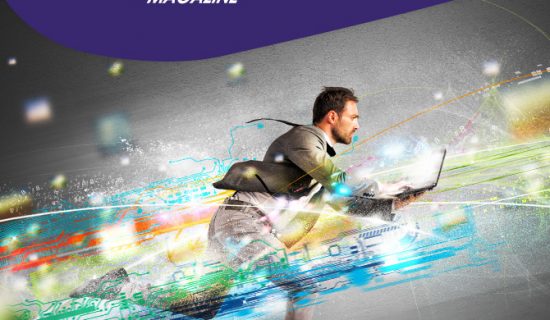"The question is not whether we will be able to return to an old normal in the coming years. If anything, the question is whether we will be able to get used to a new normal."
These are the words of Andreas Backhaus, a German economist, specializing in demography and economic history, in recent days multi-interviewed on the topic of the "mystery" of Covid19 numbers in Germany.
The condition of normality brings with it, in the common imagination, concepts such as custom, regularity, freedom of action, of movement, of choice ... possibility of acting without having to carry out a reconnaissance and selection of contingencies, without having to assess the dangerousness of an action or interaction...
Backhaus says it well then ... after Covid19 a return to normalcy, as understood until December 2019, will not be possible .... and perhaps not even desirable. Instead, it will be necessary to be able to become accustomed to the new A-Normality, to a condition of non-responsiveness to objective criteria of prediction, judgment or classification:
- at the human level this leads to a feeling of anxiety. Human beings need balance and constancy of stimuli; uncertainty induces emotional instability ...
- in business, uncertainty leads to instability in financial markets, difficulty in medium- and long-term planning, and inability to pursue choices and make decisions
New Normal in terms of business and economics has been talked about since 2007/2008, in reference to the economic conditions that followed the financial crisis, and even more so to the ensuing Global Recession (2008/2012).
In the current global pandemic situation, the term has also taken on a social connotation, referring to the change in individual behavior in the resumption of daily life: no more hugs and handshakes, social distancing.
New social habits mandated by law have generated new behaviors enabled by digitization, according to a recent study by Porsche Consulting, which underscores the need for companies to take notice and include them in their Phase2 growth strategy:
- Social distancing, which changes business channels, product formats and customer relationships
- Remote collaboration, which translates administrative tasks into smart working, and evolves sophisticated high value-added services
- digitally trackingone's health status, which could enable new business models for pharmaceutical and med-tech companies
- change in transportation habits, which accelerates the move toward sustainable mobility, local cohesion, which fosters the "back to authentic products"trend, and support for neighborhood business
- greater social responsibility,which increasingly leads companies to reflect on their value proposition
- Increased confidence in the authorities and the strengthening of the role of institutions, both in protecting the health of citizens and in supporting the economy, with consequent effects on the strategic financing of some sectors
- relaxation of privacy, resulting in greater acceptance of the sharing of personal dataoncethe relevant positive results are visible.
The stages of transformation
Josef Nierling, managing director of Porsche Consulting, adds, "This crisis has activated a range of new behaviors, rapidly strengthened our ability to collaborate virtually, accelerated ongoing transformations and anticipated innovations, bringing the imagined future into the present. Companies will consolidate the new business models and ways of working learned in response to the acute phase of the crisis. Phase 1 forced us to change," Phase 2 "represents a valuable period of further learning and fine-tuning of what will allow us to grow into Phase 3. Today we must be ambidextrous, managing the crisis on the one hand and building for the future with those decisions we anticipated in the previous months that can be the source of our competitive advantage in the 'new normal'."
From the considerations so far, it becomes clear that there is a need for an awareness that what we are going through is not a parenthesis, a moment, but an existing condition from now on. However much the restrictions imposed by law may come to an end, what has happened in the past two months leaves a scar in people's lives and in the survival of businesses: in a kind of evolutionary theory of organizations, those who have not organized themselves to learn from the pandemic-related contingency are destined to succumb, or have already done so, leaving room for those who have learned new skills, often digital, and perhaps had to experiment with a new and evolved business model. The choices made in the emergency must be consolidated into business strategy, allowing us to read the changes, we have seen even sudden ones, that the world presents us with and to correct operations as we go along, to redeploy business according to fluctuations due to contingencies.
Roberto Liscia (President of Netcomm and President of the Federation of Digital), analyzes the evolution of the approach to consumption in these months of enormous changes, dividing it into 3 phases, conditioned by the "survival" instinct and the satisfaction of needs as positioned by Maslow, which can be reframed as follows:
- PHASE 1 - FEAR: In the first few weeks, the consumer, driven by fear, thought only of essential consumption (food, medicines, necessary products for personal and household hygiene)
- STAGE 2 - AWARENESS: The situation was beginning to become familiar, and so conscious but necessary purchases were again possible for survival in the medium to long term
- STAGE 3 - NEW NORMAL: the purchase of unnecessary products, clothing, fashion products, and accessories has begun again
Changes on consumption habits have greatly affected the actions taken by companies, which, some proactively and others reactively, have had to adopt new models in order to adapt to the new normal.
So here are the companies, regardless of size, seniority, or structuring, during the pandemic have either pursued the digitization of their systems and processes at instantaneous speed, or converted their business on the fly, or activated lateral thinking, generating "unprecedented entrepreneurial dynamism." So says Marco Gay, CEO of Digital Magics' hi-tech accelerator, according to whom innovation ideas in the Covid period speak of "very concrete projects, real answers to real needs."
We are spectators of great evolutions: we have seen ethics, solidarity and the environment become guiding values of development while at the same time digital technology becomes the engine that moves every sector. We have seen companies evolve their business systems, at the same time trying to create a useful service for people or to make a solidarity contribution, getting in return an increase (quantitative and territorial) of their brand reputation and/or the birth of a new line of business.
In a world where a small parasitic being ensures its survival by decimating lives, blocking international systems, restricting people's lives and halting the work of companies of any size, the ability to adapt to the New Normal, which is itself in constant flux, allows survival.
The tools of the New Normal
As we wait for a vaccine that will rid us of this virus and in the uncertainty of what else may happen tomorrow, the only option is to equip ourselves with those tools that allow people and organizations to continue their lives and activities, untethered from physical locations and safe in their homes. Fortunately, in this we are facilitated by the evolution of cloud-based digital technologies that make it possible to recreate a "virtual workplace" in which to find activities, roles, people, tasks, organization, processes, without the need to move.
In this period of uncertainty, large companies have moved their entire business to the cloud, allowing their employees' work to continue without interruption; small and micro companies, forced to resort to digital process management systems, are considering post-pandemic "dissolving" their physical location.
Of all the improvised forced emergency-induced changes, certainly the use of digital management of one's organization deserves to become a strategic business asset.
The key to the transformation of the uncertainty of emergency into the ability to manage and succeed in the new normal is therefore the combination of Digital and BPM. In order not to be caught unprepared, it is necessary to identify right now a cloud technology, which would allow for remote and mobile management of organizational processes; in addition, it is necessary that this tool ensure maximum security to protect transactions and information, easily adaptable to circumstances, and allow for changes to be made in a short time and without necessarily resorting to the intervention of consultants or system integrators. This would allow organizations to modify their processes and manage them digitally, should new emergencies such as the current one loom.

Editorial by:
Rita Genchi - Sales & Marketing Specialist Openwork
JAMIOPILL | COVID-19: Is our visitor registry in compliance?
It has become increasingly important for businesses not to be caught unprepared in the face of stringent new security regulations.
With this short Video-pill we outline a Smart and secure method for managing your Visitor Registry.
Want to learn more about the topic?








